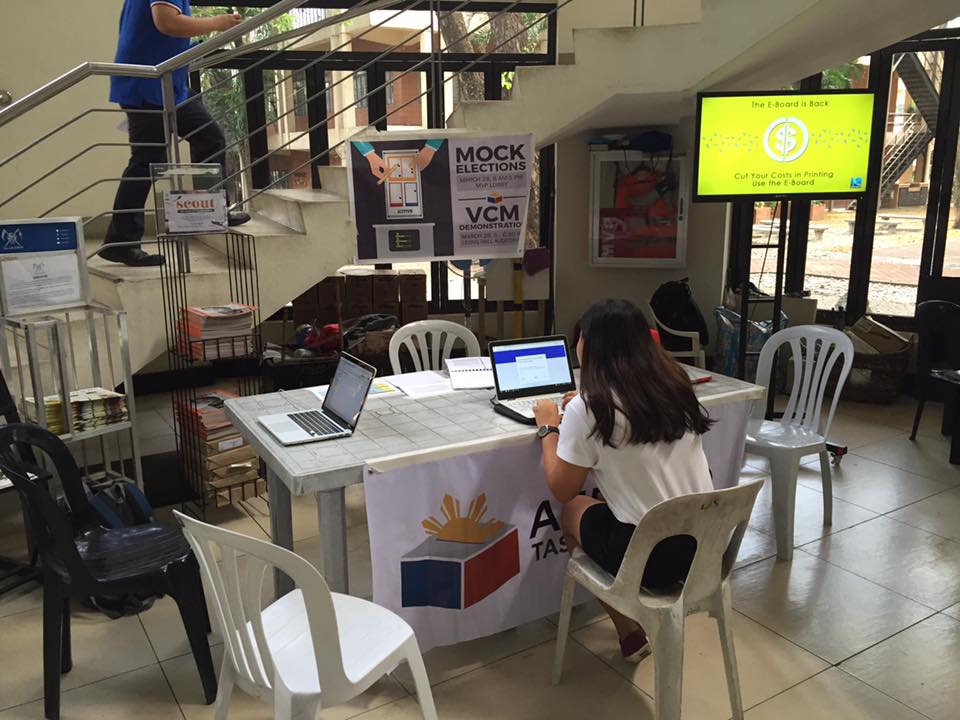LIBERAL PARTY standard-bearer Manuel “Mar” Roxas II, along with his running mate Maria Leonor “Leni” Robredo, emerged as the top choice for president and vice president (VP) respectively in the Ateneo de Manila University Mock Elections for National Positions (AMEN) held on the first week of April at the Ateneo’s Loyola Heights and Professional Schools campuses.
According to the official tally released by the Ateneo Task Force (ATF) 2016 in its Facebook page, Roxas garnered a total of 875 votes, which constituted 37.22% of the participating university electorate.
Trailing behind Roxas are Davao City Mayor Rodrigo Duterte, who garnered 665 votes (28.29%), Senator Grace Poe with 322 votes (13.20%), Senator Miriam Defensor-Santiago with 264 votes (11.23%), and Vice President Jejomar Binay with 71 votes (3.02%).
In addition, a total of 154 “abstain” votes (6.55%) for president were recorded.
Robredo, on the other hand, topped the vice presidential race with a total of 1,760 votes, which represented 74.86% of the electorate, leading past Senator Ferdinand Marcos Jr. with 244 votes (10.38%), Senator Alan Peter Cayetano with 201 votes (8.55%), Senator Francis Escudero with 68 votes (2.89%), Senator Antonio Trillanes IV with 21 votes (0.89%), and Senator Gregorio Honasan with 11 votes (0.47%).
“Abstain” votes for vice president, however, amounted to 46 votes (1.96%).
The 12 senatorial candidates who garnered the most votes are as follows: Richard Gordon with 1639 votes, Risa Hontiveros with 1552 votes, Leila de Lima with 1404 votes, Frank Drilon with 1092 votes, Francis Pangilinan with 1090 votes, Ralph Recto with 1017 votes, Sergio Osmena III with 892 votes, Teofisto Guingona III with 790 votes, Miguel Zubiri with 727 votes, Panfilo Lacson Sr. with 710 votes, Sherwin Gatchalian with 580 votes, and Joel Villanueva with 557 votes.
According to ATF, a total of 2,351 voters comprised of students, teaching and non-teaching personnel took part in the mock elections.
However, ATF clarified that “the number of actual voters [in the mock elections] does not constitute a representative sample of all eligible voters in the [Ateneo de Manila University campuses].”
The 2016 AMEN is a joint initiative of the Ateneo’s various school units, Information Technology Resource Management Office, Office of Human Resources and Management Organization Development, ATF 2016, Ateneo Statistics Circle (A-Stat), and the Office of the Vice President for Social Development.
ATF is the university’s official student mobilization arm for the upcoming national elections while A-Stat is an accredited student organization that forms part of the Issue and Policy Analysis Cluster of the Council of Organizations of the Ateneo.
Execution
The AMEN was conducted on March 29 in the Loyola Heights Grade School and High School campuses, April 2 in the School of Government, April 2 and April 4 to 8 in the Graduate School of Business, April 5 in the School of Medicine and Public Health, and April 7 to 8 in the Law School.
For the Loyola Schools, the mock election was initially scheduled on March 28 at Manuel V. Pangilinan Center for Student Leadership lobby from 8:00 AM to 5:00 PM.
However, a bomb threat which was received by the said campus on March 28 led to a university-wide evacuation and, eventually, to the postponement and deferral of its mock elections to April 4 on the initially set time and venue.
In compliance with the university memo released by Vice President for Social Development Jaime Hofilena on 28 March 2016, the casting of votes was done only in respective designated registration and polling stations in each campus and was facilitated with the use of Google Forms, a data-collection tool accessible online, which served as the ballot.
In an interview with The GUIDON, ATF 2016 Phase III-Election and Monitoring Head Gian Infante explained that the mock elections pushed through with the use of the Google Forms due to the limited time schedule and to protect the sanctity of votes.
“[The use of Google Forms served] as a way to make sure that ballots are easily accessible to other campuses and have a unified database for results reporting, yet secure enough to not link individuals to their respective votes,” he said.
Furthermore, the memo also defined the University electorate as “composed of all enrolled students of voting age, faculty members and teachers, professionals, administrators, staff and consultants of all the units and schools of [Ateneo].”
“Voters in each campus have to be Filipinos, have been issued official University identification cards [to be presented in the voting stations] and have the right to participate in the AMEN, as well as to refrain from doing so,” the memo stated.
Increased and enhanced voter turnout
Organizers of the AMEN noted that the mock elections fared better in terms of student participation as compared to similar initiatives conducted in the previous months.
According to Infante, the student voter turnout of 775 was higher than the baseline they had set based on the past Sanggunian elections.
“The total of 2,351 voters for the whole university is generally well-received, and it is important to note that not only students voted, but other community members as well, ranging from university administrators, professors, to non-teaching staff and employees from the different offices of the university,” he said.
A-Stat Vice President for Research and Consultancy Richie Sison, on the other hand, noted that the AMEN turned out to be a bigger project than the Atenean Pulse studies that A-Stat has conducted this school year.
The Atenean Pulse is a series of surveys conducted by A-Stat in partnership with the ATF in which respondents are not merely asked which candidates they will vote but also the reasons behind their choices.
“[The reason behind the greater turnout] was mainly due to the fact that more and more Ateneans are becoming engaged in the national elections as the said event is drawing closer,” Sison said.
Clearing misconceptions
Infante clarified that the AMEN does not intend to accurately represent the voting preference of the whole Ateneo community and the university as an institution in itself.
“The goal of the mock elections instead [is] to provide an avenue for our community members to express their support for particular candidates who they think represent their best interests in the upcoming National Elections,” Infante said.
He added that the goal of the mock elections goes beyond just finding out which candidates will be highly favored by the Ateneo community because respondents are also asked regarding their respective reasons for voting a certain candidate and their sources for candidate information.
Similarly, Sison added that the AMEN also aims “to serve as a vehicle for discourse in preparation for the upcoming national elections.”
“In a generation with rowing political apathy, I think the mock election is a way for us to involve [ourselves] and help Ateneans participate in the important national discourse,” Sison said.
Mixed Reactions
Members of the Ateneo community expressed various sentiments regarding the results of the mock elections.
In an email correspondence with The GUIDON, History Assistant Professor Jo-Ed Tirol, PhD said that while the outcome of the mock elections came as no surprise for him, he was particularly amused with how Binay still got a few number of votes.
He also shared that he has heard dismay from his colleagues over the fact that Marcos got over two hundred votes from the Ateneo community.
“Sadly, this is the price we pay for society’s failure, even inside our university, to really emphasize and explain the legacy of two decades of Marcos misrule and what Bongbong’s refusal to acknowledge and apologize really says about him and his fitness as a national leader,” Tirol said.
English Instructor Miguel Lizada, however, believes that the outcome of the mock polls “should be taken for what it is” and be treated as nothing more than “a snapshot of a larger event.”
“I also wouldn’t say that those who voted for Candidate X are more learned than those who chose Candidate Y, but the results in a way are reflective of what the concerns and privileged issues of the community are,” Lizada added.
Political science junior Jim Matthew Ham aired similar sentiments, saying that the results of the mock elections “should always be interpreted with caution.”
While he believes that the outcome of the mock elections is an “affirmation” and “call for continuity” of the current administration’s policies and program, he points out that the mock polls do not entirely represent the voting preference of the whole university population.
“These results should be used as an avenue for critical thinking and discernment. After all, it is not only the Ateneans’ future that is on the line, but that of the whole Filipino nation,” Ham said.







